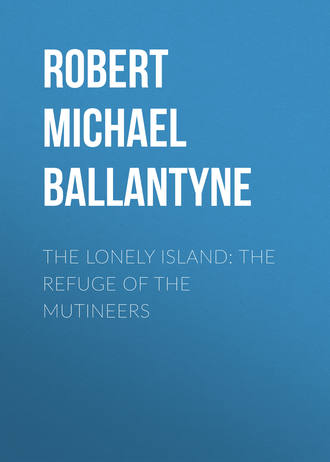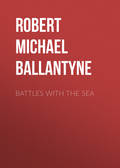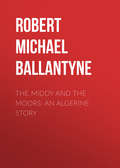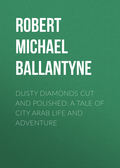
Robert Michael Ballantyne
The Lonely Island: The Refuge of the Mutineers
Chapter Seven
Roasting, Foraging, and Fabricating
One morning John Adams awoke from a pleasant dream and lay for some time on his back, in that lazy, half-conscious fashion in which some men love to lie on first awaking. The canopy above him was a leafy structure through which he could see the deep azure of the sky with its few clouds of fleecy white. Around him were the rude huts of leaves and boughs which his comrades had constructed for themselves more or less tastefully, and the lairs under bush and tree with which the Otaheitan natives were content. Just in front of his own hut was that of Fletcher Christian. It was more thoroughly built than the others, being partly formed of planks and other woodwork saved from the Bounty, and was well thatched with the broad leaves of tropical plants.
In front of the hut Christian’s wife, Isabella, was busily engaged digging a hole in the ground. She was the only member of the party astir that morning.
“I wonder why Mainmast is up so early,” murmured Adams, rousing himself and using his elbow as a prop while he observed her.
Mainmast, who was better known by that sobriquet than by the name which Christian had given to her on his wedding-day at Otaheite, was a very comely and naturally amiable creature, graceful in form, and although a so-called savage, possessing an air of simple dignity and refinement which might almost be termed lady-like. Indeed, several of the other native wives of the mutineers were similar to Mrs Christian in these respects, and, despite their brown complexions, were remarkably good-looking. One or two, however, were commonplace enough, especially the wives of the three married Otaheitan men, who seemed to be, as no doubt they were, of a lower social class than the others who had mingled with the best Otaheitan society, Edward Young’s wife, for instance, being a sort of native princess—at least she was the daughter of a great chief.
The dress of these women was simple, like themselves, and not ungraceful. It consisted of a short petticoat of tapa, or native cloth, reaching below the knees, and a loose shawl or scarf of the same material thrown over the shoulders.
After gazing a short time, Adams perceived what Mainmast was about. She was preparing breakfast, which consisted of a hog. It had been shot by Christian the night before, partly because it annoyed him with pertinacious grunting in the neighbourhood of his hut, and partly because several families of hoglets having been born soon after their arrival on the island, he could not be charged with extravagance in giving the people a treat of flesh once in a way.
The process of cooking the hog was slow, hence the early move. It was also peculiar, therefore we shall describe it in detail, in order that the enterprising housewives of England may try the plan if convenient.
Mainmast’s first act was to kindle a large fire, into which she put a number of goodly-sized and rounded stones. While these were heating, she dug a large hole in the ground with a broken shovel, which was the only implement of husbandry possessed at that time by the community. This hole was the oven. The bottom of it she covered with fresh plantain leaves. The stones having been heated, were spread over the bottom of the hole and then covered with leaves. On this hotbed the carcass of the pig was placed, and another layer of leaves spread over it. Some more hot stones were placed above that, over which green leaves were strewn in bunches, and, finally, the whole was covered up with earth and rubbish piled up so as to keep in the heat.
Just as she had accomplished this, Mainmast was joined by Mrs Young (Susannah) and Mrs McCoy.
“Good-morning,” said Mrs Christian, using the words of salutation which she had learned from the Europeans. “The hog will not be ready for a long time; will you help me with the cakes?”
The women at once assented, and set to work. They spoke to each other in the Otaheitan tongue. To their husbands they spoke in a jumble of that tongue and English. For convenience we shall, throughout our tale, give their conversations in ordinary English.
While Mrs McCoy prepared some yams and sweet potatoes for baking, Mrs Young compounded a cake of yams and plantains, beaten up, to be baked in leaves. Mainmast also roasted some breadfruit.
This celebrated fruit—but for which the Bounty, would never have been sent forth, and the mutiny with its wonderful consequences would never have occurred—grows on a tree the size of a large apple-tree, the leaves of which are of a very deep green. The fruit, larger than an orange, has a thick rind, and if gathered before becoming ripe, and baked in an oven, the inside resembles the crumb of wheaten bread, and is very palatable. It lasts in season about eight months of the year.
While the culinary operations were going on, the precocious Sally, awaking from her slumbers, rose and staggered forth to survey the face of the newborn day. Her little body was clothed in an admirably fitting garment of light-brown skin, the gift of Nature. Having yawned and rubbed her eyes, she strayed towards the fire. Mrs Christian received her with an affable smile, and presented her with a pannikin of cocoa-nut milk to keep her quiet. Quaffing this beverage with evident delight, she dropped the pannikin, smacked her rosy lips, and toddled off to seek adventures. Her first act was to stand in front of Isaac Martin’s hut, and gaze with a look not unmixed with awe at the long nose pointing to the sky, from which sonorous sounds were issuing.
It is said that familiarity breeds contempt. It was obvious that the awesome feeling passed from the infant’s mind as she gazed. Under the impulse of a sudden inspiration she entered the hut, went up to the nose, and tweaked it.
“Hallo!” shouted Martin, springing up and tumbling Sally head over heels in the act. “Oh, poor thing, I haven’t hurt you, have I?”
He caught the child in his arms and kissed her; but Sally seemed to care neither for the tumble nor the kisses. Having been released, she sallied from the hut in search of more adventures.
Martin, meanwhile, having been thoroughly aroused, got up and went towards the fire.
“You’re bright and early, Mainmast,” he said, slowly filling his pipe.
“Yes, hog takes time to cook.”
“Hog is it, eh? That’ll be first-rate. Got sauce for it?”
“Hog needs no sauce,” said Mrs Christian, with a laugh. To say truth, it required very little to arouse her merriment, or that of her amiable sisterhood.
When Martin had lighted his pipe, he stood gazing at the fire profoundly, as if absorbed in meditation. Presently he seized a frying-pan which lay on the ground, and descended therewith by way of the steep cliffs to the sea.
While he was gone, one and another of the party came to the fire and began to chat or smoke, or both, according to fancy. Ere long Martin was seen slowly ascending the cliffs, holding the frying-pan with great care.
“What have you got there?” asked one.
“Oysters, eh?” said another, scrutinising the pan.
“More like jelly-fish,” said Young.
“What in all the world is it?” asked Adams, as the pan was put on the fire.
“You’ll see when it boils,” said Martin.
“There’s nothin’ in it at all but water,” said Quintal, somewhat contemptuously.
“Well, I’ve heerd of many a thing, but never fried water,” remarked McCoy.
“I should think it indigestible,” said Christian, coming up at the moment.
Whether the natives understood the jest or not we cannot say, but certain it is that all of them, men and women, burst into a fit of laughter at this, in which they were joined by Otaheitan Sally from mere sympathy.
“Well, what is to be the order of the day?” asked Christian, turning to Young. “Shall we proceed with our dwellings, or divide the island into locations?”
“I think,” answered the midshipman, “that some of us at least should set up the forge. I know that Williams’s fingers are tingling to grasp the sledge-hammer, and the sooner he goes at it, too, the better, for we’re badly off for tools.”
“If you don’t require my services,” said Brown, “I’ll go plant some breadfruits and other things at that sheltered spot we fell upon yesterday.”
“I intend to finish the thatching of my hut,” said Quintal, in that off-hand tone of independence and disregard of the wishes of others which was one of his characteristics.
“Well, there are plenty of us to do all the work,” said Christian. “Let every man do what pleases himself. I would only ask for one or two volunteers to cut the water-tanks I spoke of yesterday. The water we have discovered, although a plentiful supply for present needs, may run short or cease altogether if drought comes. So we must provide against a dry instead of a rainy day, by cutting a tank or two in the solid rock to hold a reserve.”
Adams and Mills at once volunteered for this duty. Other arrangements were soon made, and they sat down to breakfast, some using plates saved from the Bounty, others flat stones as substitutes, while empty cocoa-nut shells served for drinking-cups.
“Your water pancake should be done brown by this time,” said Young, as he sat down on the turf tailor-wise.
“Not quite, but nearly,” returned Martin, as he stirred the furiously-boiling contents of the frying-pan.
In a few minutes more the sea water had boiled quite away, leaving a white residuum, which Martin scraped carefully off into a cocoa-nut cup.
“You see, boys,” he said, setting down the salt thus procured, “I never could abide fresh meat without a pick o’ salt to give it a relish. It may be weakness perhaps, but—”
“Being the weakness of an old salt,” interrupted Christian, “it’s excusable. Now, boys, fall-to with a will. We’ve got plenty of work before us, an’ can’t afford to waste time.”
This exhortation was needless. The savoury smell of the roast pig, when it had been carefully disentombed, might have given appetite to a seasick man. They ate heartily, and for some time in silence.
The women, however, did not join in the feast at that time. It was the custom among the Otaheitans that the men should eat first, the women afterwards; and the mutineers, having become habituated to the custom, did not see fit to change it. When the men had finished and discussed the day’s proceedings, the remainder of the pig, fruits, and vegetables, were consumed by the females, among whom, we are bound to state, Sally was the greatest gourmand.
When pipes were finished, and the digestion of healthy young men had been thus impaired as far as was possible in the circumstances, the party went off in several groups about their various avocations.
Among other things removed from the Bounty were a smith’s anvil and bellows, with various hammers, files, etcetera, and a large quantity of iron-work and copper. One party, therefore, under Young and Williams the armourer, busied themselves in setting up a forge near their settlement, and preparing charcoal for the forge fire.
Another party, under Christian, proceeded to some neighbouring rocks, and there, with sledge-hammer and crowbars, which they used as jumpers, began the laborious task of boring the solid rock, intending afterwards to blast, and partly to cut it, into large water-tanks. Quintal continued the thatching of his hut, in which work his humble wife aided him effectively. Brown proceeded with the planting operations which he had begun almost immediately after landing; and the women busied themselves variously, some in preparing the mid-day meal, some in gathering fruits and roots for future use, and others in improving the internal arrangements of their various huts, or in clearing away the débris of the late feast. As for little Sally, she superintended generally the work of the home department, and when she tired of that, went further afield in search of adventures.
Chapter Eight
Division of the Island—Moralisings, Misgivings, and a Great Event
There was no difficulty in apportioning the new possessions to which the mutineers had served themselves heirs. In that free-and-easy mode in which men in power sometimes arrange matters for their own special behoof, they divided the island into nine equal parts, of which each appropriated one part. The six native men were not only ignored in this arrangement, but they were soon given to understand, by at least several of their captors, that they were to be regarded as slaves and treated as such.
It is, however, but just to Edward Young to say that he invariably treated the natives well and was much liked by them, from which it is to be supposed that he did not quite fall in with the views of his associates, although he made no objection to the unjust distribution of the land. John Adams, being an amiable and kindly man, also treated the natives well, and so did Fletcher Christian; but the others were more or less tyrannical, and those kindred spirits, Matthew Quintal and William McCoy, treated them with great severity, sometimes with excessive cruelty.
At first, however, things went well. The novelty and romance of their situation kept them all in good spirits. The necessity for constant activity in laying out their gardens, clearing the land around the place of settlement, and erecting good log-houses,—all this, with fresh air and abundance of good food, kept them in excellent health and spirits, so that even the worst among them were for a time amiably disposed; and it seemed as if those nine men had, by their act of mutiny, really introduced themselves into a terrestrial paradise.
And so they had, as far as nature was concerned, but the seeds of evil in themselves began ere long to grow and bear fruit.
The fear of the avenger in the form of a man-of-war was constantly before their minds. We have said that the Bounty had been burnt, and her charred remnants sunk to remove all traces of their presence on the island. For the same end a fringe of trees was left standing on the seaward side of their clearing, and no erection of any kind was allowed upon the seaward cliffs or inland heights.
One afternoon, Christian, who had been labouring in his garden, threw down his tools, and taking up the musket which he seldom left far from his hand, betook himself to the hills. He was fond of going there, and often spent many hours in solitary watching in the cave near the precipitous mountain-peak.
On his way up he had to pass the hut of William McCoy. The others, conforming to the natural tendency of mankind to congregate together, had built their houses round the cleared space on the table-land above Bounty Bay, from which central point they were wont to sally forth each morning to their farms or gardens, which were scattered wide apart in separate valleys. McCoy, however, aspired to higher heights and grander solitudes. His dwelling, a substantial log-hut, was perched upon a knoll overlooking the particular valley which he cultivated with the aid of his Otaheitan wife and one of the native men.
“You are getting on well,” said Christian to McCoy, who was felling a tree when he came up to him.
“Ay, slowly, but I’d get on a deal faster if that lazy brown-skin Ohoo would work harder. Just look at him. He digs up that bit o’ ground as if he was paid by the number o’ minutes he took to do it. I had to give him a taste of a rope’s end this morning, but it don’t seem to have done him much good.”
“It didn’t seem to do much good to you when you got it on board the Bounty,” said Christian, gravely.
“P’r’aps not; but we’re not on board the Bounty, now,” returned McCoy, somewhat angrily.
“Depend on it, McCoy,” said Christian, softening his tone, “that the cat never made any man work well. It can only force a scoundrel to obedience, nothing more.”
“H’m, I b’lieve you’re not far wrong, sir,” returned the other, resuming his work.
Giving a friendly nod to Ohoo as he passed, and a cheerful “good-morning” to Mrs McCoy, who was busy inside the hut, Christian passed slowly on through the luxuriant herbage with which that part of the hillside was covered.
At first he walked in the shade of many-stemmed banyans and feathery-topped palms, while the leaves of tall and graceful ferns brushed his cheeks, and numerous luxuriant flowering plants perfumed the air. Then he came to a clump of bushes, into which darted one of the goats that had by this time become almost wild. The goat’s rush disturbed a huge sow with a litter of quite new pigs, the gruntings and squeakings of which gave liveliness to an otherwise quiet and peaceful scene.
Coming out on the shoulder of the mountain just above the woods, he turned round to look back. It was a splendid panorama of tropical vegetation, rounded knolls, picturesque mounds, green patches, and rugged cliffs, extending downwards to Bounty Bay with its fringe of surf, and beyond—all round—the sleeping sea.
Two or three little brown, sparrow-like birds twittered in the bushes near, and looked askance, as if they would question the man’s right to walk there. One or two active lizards ran across his path, pausing now and then, and glancing upwards as if in great surprise.
Christian smiled sadly as he looked at them, then turned to breast the hill.
It was a rugged climb. Towards the top, where he diverged to the cave, every step became more difficult.
Reaching the hole where Isaac Martin had come by his misadventure, Christian descended by means of a rude ladder which he had constructed and let down into it. Entering the cave, he rested his musket against the wall of rock, and sat down on a ledge near the opening towards the sea. It was a giddy height. As he sat there with hands clasped over one knee and eyes fixed wistfully on the horizon, his right foot, thrust a little beyond the edge of the rock, overhung a tremendous precipice, many hundred feet deep.
For a long time he gazed so steadfastly and remained so motionless as to seem a portion of the rock itself. Then he heaved a sigh that relieved the pent-up feelings of an overburdened soul.
“So early!” he muttered, in a scarcely audible voice. “At the very beginning of life, just when hope, health, manhood, and opportunity were at the flood.”
He stopped, and again remained motionless for a long time. Then, continuing in the same low, sad tone, but without altering his position or his wistful gaze.
“And now, an outlaw, an outcast, doomed, if taken, to a felon’s death! Comrades seduced to their ruin! The brand of Cain not more terrible than mine! Self-exiled for life! Never, never more to see friends, country, kindred, sisters—mother! God help me!”
He laid his face in his hands and groaned aloud. Again he was silent, and remained without motion for nearly an hour.
“Can it be true?” he cried in a voice of suppressed agony, looking up as if expecting an answer from heaven. “Shall I never, never, never awake from this hideous dream!”
The conscience-smitten young man laid strong constraint upon himself and became calmer. When the sun began to approach the horizon he rose, and with an air of stern resolution, set about making various arrangements in the cave.
From the first Fletcher Christian had fixed on this cavern as a retreat, in case his place of refuge should be discovered. His hope was that, if a man-of-war should come at last and search the island, he and his comrades might escape detection in such a sequestered and well-concealed cavern. If not, they could hold out to the last and sell their lives dearly. Already he had conveyed to it, by degrees, a considerable supply of ammunition, some of the arms and a quantity of such provisions as would not readily spoil with time. Among other things, he carried to that elevated outlook Carteret’s book of voyages and some other works, which had formed the very small library of the Bounty, including a Bible and a Church of England Prayer-book.
When not gazing on the horizon, expecting yet fearing the appearance of a sail, he passed much of his time in reading.
On the evening of which we write he had beguiled some time with Carteret, when a slight sound was heard outside the cavern.
Starting up with the nervous susceptibility induced by a guilty conscience, he seized his musket and cocked it. As quickly he set it down again, and smiled at his weakness. Next moment he heard a voice shouting. It drew nearer.
“Hallo, sir! Mr Christian!” cried John Adams, stooping down at the entrance.
“Come down, Adams, come down; there’s no occasion to keep shouting up there.”
“True, sir; but do you come up. You’re wanted immediately.”
There was something in the man’s voice which alarmed Christian. Grasping his musket, he sprang up the ladder and stood beside his comrade.
“Well?”
“It’s—it’s all right, sir,” said Adams, panting with his exertions in climbing the hill; “it’s—it’s a boy!”
Without a word of reply Christian shouldered his weapon, and hurried down the mountain-side in the direction of home.







